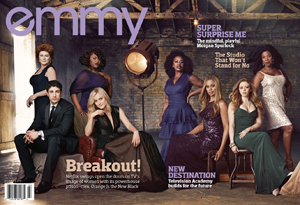Category Agnostic: The 2014 Emmy Nominations
 Bruce Rosenblum wanted this year’s Emmy nominations to be about how the Television Academy sits at the foreground of the television future. His suggestion during his opening remarks that “quality television is now platform agnostic” goes even further than previous remarks seeking to acknowledge the rise of Netflix and other streaming competitors. And while the arrival of Orange Is The New Black—competing with its first season a month after its second debuted on Netflix—means Netflix is a bigger story this year than last, platforms are not the story at this year’s Emmy nominations.
Bruce Rosenblum wanted this year’s Emmy nominations to be about how the Television Academy sits at the foreground of the television future. His suggestion during his opening remarks that “quality television is now platform agnostic” goes even further than previous remarks seeking to acknowledge the rise of Netflix and other streaming competitors. And while the arrival of Orange Is The New Black—competing with its first season a month after its second debuted on Netflix—means Netflix is a bigger story this year than last, platforms are not the story at this year’s Emmy nominations.
Agnosticism is, however. This year’s Emmy nominations demonstrate that notions of television quality are category agnostic, in that the same performers or series are likely to garner nominations even if they show up in a fundamentally different category than they appeared in previously, or if they emerge in a category that actively takes advantage of the vagaries of the Emmy nominations system. Whereas the rules governing Emmy Award categories—as I’ve discussed previously—can fundamentally shape who is nominated in meaningful ways, this year also reveals the inherent slipperiness of those categories in the midst of an increasingly competitive environment.
This slipperiness is not new—Downton Abbey has competed for both Miniseries and Drama Series, and the rise of the half-hour “dramedy” has inherently called into question the broad distinction between comedy and drama operating in the Emmy nominations process. But this year there is a much larger collection of series straddling these lines. True Detective, a close-ended miniseries that will return for a second stand-alone season, is nominated for Outstanding Drama Series, while Fargo—also a close-ended miniseries that could return for a second stand-alone season—is competing in Outstanding Miniseries (with American Horror Story, which brought this emergent television form into the Emmy conversation two years ago). Orange is the New Black competed as a Drama at the Screen Actors Guild and the Golden Globes earlier this year, but is nominated as a Comedy at the Emmys (which is also competed as for the Writers’ Guild Awards). Shameless, which competed as a drama for three seasons, moved to Comedy and garnered William H. Macy his first nomination in a less crowded lead actor category. The Outstanding Miniseries category includes only one program we could unequivocally consider a miniseries, with the other five nominees each slotting into one category vagary—a short final season (Treme), canceled after a single season (The White Queen), a short British season (Luther)—or another.
This has typically been framed as “category fraud,” but such a term presumes there are explicit rules being broken, or that networks or channels making these choices are doing something “wrong.” While any categorization has to pass Academy scrutiny—Shameless had to apply for the change, for example—there is no real basis on which the Academy could refuse these distinctions. There is no rule against Netflix using the various other awards earlier in the year to test out how Orange Is The New Black competes as both a Drama and a Comedy before making a final decision. There is no rule against HBO taking True Detective out of the Miniseries category to maximize the channel’s chances of winning its first Drama Series Emmy since The Sopranos and leave the Movie/Miniseries field more open for Ryan Murphy’s The Normal Heart. While there are undoubtedly limits to a network or channel’s ability to redefine programming with a distinct generic or formal identity, this year reveals that those limits have yet to be reached.
 In truth, the Emmys have always been slightly category agnostic. History has shown voters will find certain actors or certain shows anywhere regardless of the category, nominated because of who they are more than because their performance was particularly well-liked—such “name-only” nominations may be primarily speculation (we cannot know for certain what Emmy voters did or did not watch), but Kristen Wiig’s nomination for her role in IFC’s absurdist miniseries Spoils of Babylon stands out as a case of voters finding Wiig—nominated five years in a row for her work on Saturday Night Live—in a different category rather than finding Spoils of Babylon (which only garnered a nomination for Theme Music otherwise).
In truth, the Emmys have always been slightly category agnostic. History has shown voters will find certain actors or certain shows anywhere regardless of the category, nominated because of who they are more than because their performance was particularly well-liked—such “name-only” nominations may be primarily speculation (we cannot know for certain what Emmy voters did or did not watch), but Kristen Wiig’s nomination for her role in IFC’s absurdist miniseries Spoils of Babylon stands out as a case of voters finding Wiig—nominated five years in a row for her work on Saturday Night Live—in a different category rather than finding Spoils of Babylon (which only garnered a nomination for Theme Music otherwise).
But whereas those decisions only threaten to reveal that Emmy voters might not consider the quality of performance in relation to the category as the primary factor in their decision-making, a long-ago accepted reality of industry awards more broadly, these more recent developments have thrown into question the Academy’s entire structuring of the Emmy nominating process. It is a process that forces categorization without enforcing particular definitions of those categories, meaning that it fundamentally encourages discursive reworking of genre or formal identities while also forcing that discursive work to latch onto specific categories—Comedy or Drama, Series or Miniseries—that may or may not logically describe the programming in question.
The consequences of this are minimal: I may believe Orange is the New Black is a drama, but that “fraud” does not alter my relationship to the series in any meaningful way. Although I will continue to argue for the Emmys as a meaningful discursive space for engaging in questions of identity and in understandings of larger trends in how television value is determined, the slipperiness of the Emmy categories is—like coverage of prominent snubs—more a point of consternation than a point of meaningful contention.
Nonetheless, however, the sheer volume of categorical question marks this year is notable. Although the nominations suggest voters are category agnostic, the very existence of categorical distinctions suggests the Academy itself is not. And while it’s hard to imagine an Emmys without distinctions between comedy and drama, or between series and miniseries, the slippery nature of those terms raises the question of whether or not the Emmys will adapt either in conjunction with or in opposition to the discursive reframing of those categories by its members’ voting patterns or the networks and channels actively taking advantage of a malleable system.



